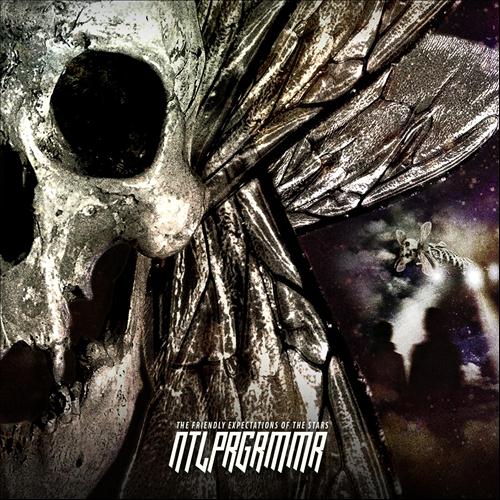Although they’re Berlin-based today, Aniaetleprogrammeur (pronounced: Ania et le programmeur) were formed in Paris in 2005. The trio consists of Hanrigabriel (direction/guitars/vox/synths), Tata Christiane (synths/machines) and Valquire Veljkovic (lights/synths/bass). (I recently reviewed Valquire Veljkovic’s fascinating side project Deer Howling.) They are a “multidisciplinary art collective” involved in music, fashion design (with the brand Tata Christiane), video, photography and graphic design. The friendly expectations of the stars is their second album. They describe their music as “dirty electro rock, electro punk, industrial electro, no-wave.”
The album opens with an intriguing intro track that features a myriad of sounds. It starts off sounding like a dusty record but it’s only a matter of seconds before we first hear some menacing rumblings and sparse piano notes. There’s also some talking way off in the distance, like subliminal messages. You turn your stereo up loud to try to decipher what they’re saying, but that also increases the volume of the other sounds, so it’s still impossible to make them out. Suffice to say you’re in a state of suspense by the time the first song begins roughly a minute later. Entitled “Realism,” I would have to describe it as horror movie score with a punchy electronic pulse. Some of the electro-beats have a harsh, clanging sound, meanwhile there’s nice, warm, bubbly bass throbbing along throughout most of it. Like the intro, there’s some talking — and moaning and groaning — way off in the background, but I had to read the lyrics to decipher it. (“Fears stand up / shift our souls.”) A little over halfway through the song, the vocals bare a sense of urgency. You fear the person you’re listening to is in some kind of serious trouble. Those vocals are much louder in the mix, but I still couldn’t understand them without the lyrics, being that the music grows louder, too. Which is fine. You’re probably better off not reading the lyrics. Not really knowing what’s going on is part of the song’s charm somehow. It adds to its mystique.
The next track, “Moldy,” sounds less like film score and more like a futuristic avant-garde song. The vocals here are so distorted that it sounds as though someone is trying to sing while being swallowed up by computers and consequently electrocuted. It’s unsettling, which seems to be the point. (“I got top secrets,” the voice sing-speaks. “Just supposed to be disclosed tonight.”) Many elements of the track are abrasive, especially the sonorous beats that leap out of your speakers and collide with your head. Meanwhile, the blaring guitars are razor sharp and seem intended to pierce your ears in a bad way, but at the same time the riffs are entirely catchy. The song overall is quite seductive, too, largely due to the slick electronic bass and assorted electro-tinkering that help make up its lush wall of sound.
None of the tracks on the album adhere to the rules of any particular genre, most of them blending at least a few, sometimes all at once. While some of the songs feel experimental, and even a bit random in the way they shift and morph, others feel highly calculated, much more precise, though still wholly artistic.
“Time Travel” blends punk riffage and aggression with hammering industrial-tinged beats; it’s like Iggy and the Stooges meets the industrial-ish artist Pig. As the song progresses, one of the guitar tracks sounds like it could be a sci-fi show theme song from the ’60’s. Eventually, it winds down until it’s almost mute then rich synth and strings interplay in a way that makes you feel like you’re actually traveling through time, perhaps making a leap to the past to avoid the apocalypse. From then on, it feels like film score orchestration meshed with an assortment of electro-beats, icy piano and many other spell-binding sounds.
The most infectious song on the album is “Low passion,” an almost danceable track which pours layers of synth — some dark, some glimmering — over rapid, hypnotic beats and other assorted percussive sounds. It also features melodic, albeit highly processed, vocals. (“My low passions and blue skies’ve never been the same than yours.”) It’s not exactly following a traditional verse chorus verse structure, but I’d say the vibe at least comes close. It’s more than just tuneful though. The song consists of so many tracks that it’s impossible to describe them all. Especially since every time I listen to it, I hear something different. It’s as though the brain isn’t capable of hearing all of the sounds at once, so it randomly selects several different tracks to listen to each time you play it.
Perhaps because I’ve been a student of French, my favorite track on the album is “Project 21,” which is a lengthy French poem set to melancholic music. (“Je m’approchais du soleil, et mes ailes telles des ailes d’icare.” Rough translation: “I approached the sun, and my wings [were] like the wings of icarus.”) It begins relatively mellow, but as it progresses the subtle humming gives way to pounding beats and blaring synth. But then it unexpectedly quiets down again. Eventually, the poetry stops and we hear faint, ominous music with austere piano. It sent several chills down my spine.
Another standout is “Affliction,” which is like Praga Khan reinventing Depeche Mode. Or a twisted collaboration between Lords Of Acid and The Cure. The many synth tracks feel like new wave pop at times and post techno at others. In the meantime the thick, luscious beats could be “Drug Against War”-era KMFDM or vintage NIN. Yet it all sounds very futuristic. Instead of avant-garde, one is tempted to call it après-garde (or post-garde). I suppose that’s not actually a thing, but, then again, maybe they’ve just created it here. Maybe they’re not trying to blur the lines between genres but concoct a new one?


Leave a Reply